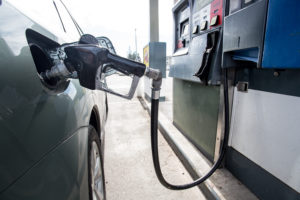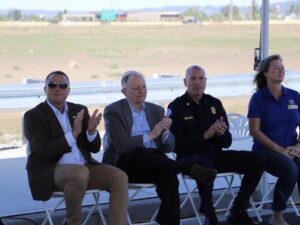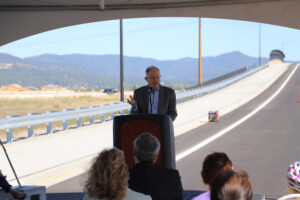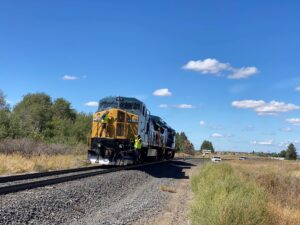Note: The following e-newsletter was sent to Sen. Padden’s subscribers September 12, 2023. To subscribe to Sen. Padden’s newsletter, click here.
Dear friends and neighbors,
Throughout this year, drivers around our state have been forced to pay much more for gasoline than in nearly every other state, with the notable exception of California. The cause for the higher gas prices is the cap-and-trade program, fully implemented on January 1 through the Climate Commitment Act that was requested by Governor Inslee and passed a couple of years ago by Democratic majorities in the Legislature.
Unfortunately, we should expect gas prices to rise yet again.
On August 30, the state Department of Ecology held its latest quarterly carbon auction under cap-and-trade. The cost of the “allowances” at that auction is expected to eventually drive the cumulative gas-price hike associated with cap-and-trade to over 51 cents a gallon.
According to AAA’s state-by-state gas price averages, Washington’s average gas price yesterday was $5.066 a gallon, roughly 30 cents a gallon more than the two next most expensive states (Hawaii at $4.784 and Oregon at $4.720) and only behind California, which tops gas prices nationally at $5.439.
It isn’t surprising that our state’s high gas prices have pushed many drivers across the border to buy cheaper gas in Idaho, which hurts retailers in Spokane County and other border counties.
Governor Inslee has encouraged the higher gas prices to happen. Besides pushing for cap-and-trade two years ago, Inslee has done nothing to reduce the higher gas prices; instead, he demonizes oil companies for passing along the higher costs to consumers. The governor has rejected proposed solutions by Republican legislators to lower gas prices. Meanwhile, low-income people, whom the governor claims to care about, have been hit especially hard since they typically must devote a larger portion of their income toward gas and transportation because of where they live, especially those in rural areas.
Since carbon auctions authorized by the state’s cap-and-trade program began this year, nearly $1.5 billion has been collected – money taken from hard-working Washingtonians for programs that will make environmentalists happy but very likely will NOT reduce carbon emissions or improve the climate.
My colleague, Senator Curtis King of Yakima and the lead Republican on the Senate Transportation Committee, issued a news release last week that criticized the most recent carbon auction and the cap-and-trade program in general.
In his news release, Senator King said: “Governor Inslee’s policy is trying to impoverish Washingtonians into changing their driving behavior by making them stop driving gas-powered cars, and at the same time attempting to make it more expensive for many people to heat their homes because cap-and-trade will raise natural-gas prices as well. This program championed by our governor is being unnecessarily cruel to many people in our state by causing fuel and heating prices to soar.”
While drivers in most states see gas prices below $4 a gallon, drivers in our state are being forced to pay at least $5 a gallon thanks to the cap-and-trade program (California, which also has a cap-and-trade program, is the other state with gas over $5). Gas prices are bound to become higher thanks to this very expensive program, which won’t do a thing to reduce global carbon emissions.
Todd Myers, the Washington Policy Center’s environmental analyst, recently wrote a column that also was critical of the latest carbon auction and its impact on gas prices. Part of Todd’s piece is especially noteworthy:
Washington’s climate law needs a significant overhaul, because even Ecology’s low projections show costs increasing through 2030. Two things should be done in the near term.
First, waive the state’s CO2 target and cap prices at California’s price. Our extremely aggressive 2030 target is a big driver in the excessive price. No amount of fiddling with the system or special auctions will make costs reasonable as long as the cap is so extreme.
Second, we should remove any restrictions on private CO2-reduction projects, sometimes called “carbon offsets.” Ecology’s own analysis shows we could reduce the same amount of CO2 for lower cost by allowing innovators to find alternative ways to cut emissions. Even as the environmental community attacks carbon offsets, they support spending government money on projects that are literally identical. For example, Washington’s taxpayer-funded Clean Energy Fund offers grants to projects like carbon capture to reduce atmospheric CO2. However, if a successful carbon-capture technology was actually created, state law would prohibit it from being used to meet requirements of the CCA. Fund a technology, then ban it. It is absurd.
Elected officials should encourage all CO2-reducing innovation in order to meet the state’s climate goals at an affordable price. The Governor and legislators don’t want that, however, because although allowing innovative approaches to cut emissions would help meet Washington’s CO2 targets, the money for those projects doesn’t go to the state. It is clear that the Governor is prioritizing increased taxes over reducing CO2 efficiently.
If you have questions about how to participate in state government this year or thoughts to share on anything in this e-newsletter, please give me a call or send me an email.
Thank you, as always, for the honor of serving as your state senator!
Best Regards,
Senator Mike Padden
Spokane Conservation District provides post-fire assistance on Oregon Fire
If you or any of your neighbors were affected by the recent Oregon Fire in northern Spokane County, the Spokane Conservation District is providing post-fire technical assistance. You can learn more or request fire assistance by going here.
The conservation district provided this information about post-fire assistance in its latest e-newsletter:
Spokane Conservation District is here to provide support and resources to landowners in Spokane County who have been impacted by the devastating Oregon Rd. fire and Gray fire. Our team of specialists will come to your property and conduct a thorough assessment, providing informed recommendations based on your goals for the property. Additionally, we will also inform landowners of current programs that may provide financial assistance for necessary actions.
Bridge event in Liberty Lake
Senator Padden (second from left) sits with Central Valley School District Superintendent John Parker (left), Spokane Valley Fire Department Chief Frank Soto Jr. (second from right) and Liberty Lake Mayor Cris Kaminskas (right) during Saturday’s ribbon-cutting ceremony for the opening of the new Lud Kramer Bridge.
Last Saturday morning, I was one of the speakers at the ribbon-cutting event for the new Lud Kramer Bridge, located in Liberty Lake. Other speakers included Liberty Lake Mayor Cris Kaminskas, Central Valley School District Superintendent John Parker, Spokane Valley Fire Department Chief Frank Soto Jr., Washington State Department of Transportation Regional Administrator Todd Trepanier and Greater Spokane Valley Chamber of Commerce President Lance Beck. The event was sponsored by the Greater Spokane Valley Chamber of Commerce.
The new bridge will help provide congestion relief for Liberty Lake. Students will have easier access to Selkirk Middle School, as well as the new Ridgeline High School that opened a few years ago. This project also will benefit the community’s police and fire departments. For example, Spokane Valley Fire Station 3 is located on the south side of the bridge and can now respond more quickly to calls to the north of I-90.
Thanks go to several people for their hard work to make the new bridge a reality, especially former Liberty Lake Mayor Steve Peterson, former state Department of Transportation Eastern Region Director Mike Gribner and current Liberty Lake Mayor Cris Kaminskas. The project was a partnership between the state Department of Transportation and the City of Liberty Lake.
With the new bridge in the background, Senator Padden speaks during the ribbon-cutting ceremony for the new span.
Work began in October 2021 on the crossing, which is named after Lud Kramer, a former Washington secretary of state who later settled in Liberty Lake. The bridge will create an additional north/south connection between Country Vista Drive and Mission Avenue. This will alleviate traffic from needing to use Harvard Road over I-90 or Barker Road.
The funding for the bridge project – nearly $9 million – was through the state Connecting Washington transportation funding package passed by the Legislature in 2015. An additional $4.1 million was provided by the City of Liberty Lake for the project. Included in that $4.1 million was a small contribution by Spokane County.
This project was part of the overall Barker to Harvard project which included:
- Roundabouts at the on/off-ramps at Barker Road and I-90.
- Widening the Harvard Bridge over I-90 in Liberty Lake to add a exit only lane for NB travel to WB I-90. This project also extended both westbound I-90 on-ramps to allow longer merge lanes.
Other recent events and meetings
A train locomotive that is part of the Palouse River and Coulee City Railroad was seen during the Harvest Rail Tour.
Over the past couple of weeks, I have attended other meetings or events in the 4th Legislative District or elsewhere in our state. Here is a partial recap of legislative events I attended:
- Harvest Rail Tour: On September 5, I joined several legislators from both sides of the state in Cheney for the annual Harvest Rail Tour, organized by the HighLine Grain Growers. The tour of the Palouse River and Coulee City Railroad began with the grain growers showing us the Four Lakes Shuttle Loading Facility, followed by a five-mile ride on Washington Eastern Railroad engines. The legislative group later went to Davenport to see rail realignment and loading facility improvements, followed by a meeting at Spokane International Airport. During the tour, legislators learned about how the rail line contributes to job growth in the region, including additional jobs at the Louisiana Pacific facility.
- Legislative Police Academy: On September 7-8, I was in Tacoma for the Legislator Police Academy, hosted by the National Conference on State Legislatures. On the first day of the event, attendees, including legislators from nine states, heard speeches by my colleague, Senator John Lovick, a former Washington State Patrol trooper and former Snohomish County sheriff; and Monica Alexander, executive director of the Washington State Criminal Justice Training Commission. Later last Thursday, two NCSL staff members shared legislative trends, followed by a legislative roundtable discussion.
Contact us!
If you have a question or concern about state government, please do not hesitate to contact our office. During the interim we are conducting business from our district office in Spokane Valley. We are here to serve you!
Phone: (509) 921-2460
Email address: Mike.Padden@leg.wa.gov
PLEASE NOTE: Any email or documents you provide to this office may be subject to disclosure under RCW 42.56. If you would prefer to communicate by phone, please contact Sen. Padden’s Olympia office at (360) 786-7606.
To request public records from Sen. Padden, please contact Randi Stratton, the designated public records officer for the Secretary of the Senate and Senate members.
















